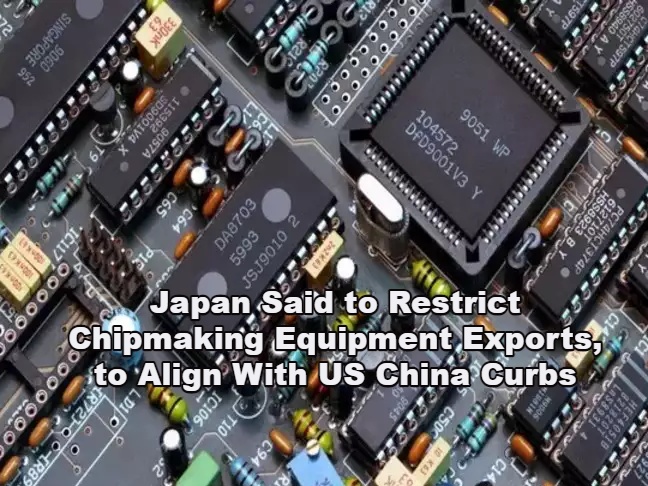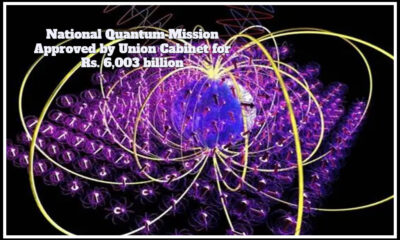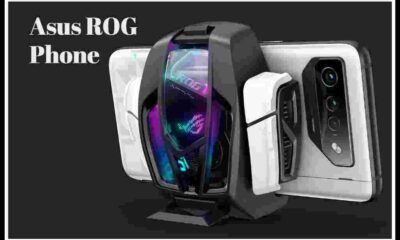Japan
Japan Said to Restrict Chipmaking Equipment Exports, to Align With US China Curbs
Published
1 year agoon

China was not named as the target of the measures by Japan.
Japan announced on Friday that it would limit the export of 23 different types of semiconductor manufacturing equipment, aligning its technology trade restrictions with a US initiative to stop China from producing sophisticated chips.
Major global chip equipment manufacturers Nikon and Tokyo Electron are based in Japan, which did not specifically name China as the target of the measures, instead stating that equipment manufacturers would need to request export authorization for every region.
Yasutoshi Nishimura, minister of economy, trade, and industry, said at a news conference that “we are fulfilling our responsibility as a technological nation to contribute to international peace and stability.”
Read Also:- India Ready To Trade In Rupee With Countries Facing Currency Crises.
According to him, Japan wants to stop the use of cutting-edge technology for military purposes and is not targeting any particular nation with its measures.
But the US administration under US President Joe Biden, which in October announced broad restrictions on China’s access to US chipmaking technology to slow its technological and military advancements, is seen as a major diplomatic winner as a result of Japan’s decision.
The US measures would be ineffective and its companies would be at a competitive disadvantage without the cooperation of industry heavyweights Japan and the Netherlands.
According to sources, Japan and the Netherlands agreed in January to join the United States in limiting equipment exports to China that could be used to produce sub-14 nanometer chips, but they chose not to publicly announce the agreement to avoid upsetting China.
Japan has never made any agreements known in public.
A nanometre, or one billionth of a meter, is a unit of measurement used in the semiconductor industry. A chip is considered to be more advanced if it has fewer nanometres.
In a letter to the Dutch parliament this month, the government announced its intention to limit the export of chipmaking machinery. The market for lithography systems, which are used to create the intricate circuitry in chips, is dominated by Dutch giant ASML Holding NV.
China urged the Netherlands “not to follow export control measures by certain countries,” accusing the Netherlands of being a “tech hegemony” due to its export restrictions.
Limited Impact?
Six categories of equipment used in chip manufacturing, including cleaning, deposition, lithography, and etching, will be subject to export controls, according to Japan.
The limitations, which became effective in July, will probably apply to equipment made by at least a dozen Japanese manufacturers, including Nikon, Tokyo Electron, Screen Holdings, and Advantest.
Given the lack of a robust domestic chip market, Takamoto Suzuki, head of economic research for Marubeni in China, claimed that the measures would be detrimental to Japanese equipment manufacturers.
According to him, “it will impede the market expansion of Japanese companies and unquestionably lessen their competitiveness from a regulatory aspect.”
When questioned about the effect, minister Nishimura stated that he anticipated a minimal effect on domestic businesses.
Observers of the industry mention potential sales in other places.
According to Takahiro Shinada, a professor at Japan’s Tohoku University, “if you take a long-term view, the effect will be diminished, with new semiconductor plants coming into operation in places like the United States and Japan.”
Japan continues to be a significant supplier of chipmaking equipment and semiconductor materials despite the country’s market share declining to about 10% from its former position as the leader in chip production. About a fifth of the world’s chipmaking tools are produced by Tokyo Electron and Screen, and the majority of silicone wafers are made by Shin-Etsu Chemical and Sumco.
Following the news, shares of Nikon and Advantest increased by 0.8 percent and 1.9 percent, respectively, broadly in line with the 1.1 percent increase in the overall market. Tokyo Electron and Screen didn’t change all that much.
A Nikon representative stated, “We will continue to comply with any rules and work to maximise our results within them.
Credent TV Editorial Team

You may like
-


National Quantum Mission Approved by Union Cabinet for Rs. 6,003 billion
-


the Google Pixel Fold will go on sale in June. Leaked renderings show two colour options.
-


Delhi now has Apple’s second location after Mumbai: CEO Tim Cook
-


Sundar Pichai, the CEO of Google, alluded to more job cuts at the tech giant
-
Apple’s iPhones are now produced in India. Sometime in the fall of 2023
-


Prior to launch, Asus ROG Phone 7 and ROG Phone 7 Ultimate renders, specifications, and pricing were leaked
